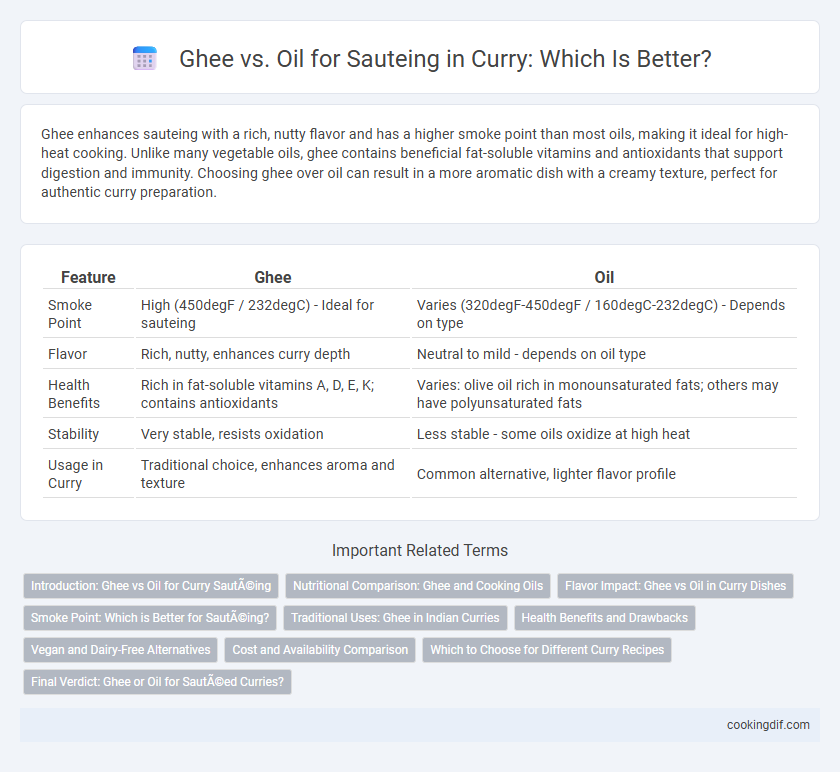Ghee enhances sauteing with a rich, nutty flavor and has a higher smoke point than most oils, making it ideal for high-heat cooking. Unlike many vegetable oils, ghee contains beneficial fat-soluble vitamins and antioxidants that support digestion and immunity. Choosing ghee over oil can result in a more aromatic dish with a creamy texture, perfect for authentic curry preparation.
Table of Comparison
| Feature | Ghee | Oil |
|---|---|---|
| Smoke Point | High (450degF / 232degC) - Ideal for sauteing | Varies (320degF-450degF / 160degC-232degC) - Depends on type |
| Flavor | Rich, nutty, enhances curry depth | Neutral to mild - depends on oil type |
| Health Benefits | Rich in fat-soluble vitamins A, D, E, K; contains antioxidants | Varies: olive oil rich in monounsaturated fats; others may have polyunsaturated fats |
| Stability | Very stable, resists oxidation | Less stable - some oils oxidize at high heat |
| Usage in Curry | Traditional choice, enhances aroma and texture | Common alternative, lighter flavor profile |
Introduction: Ghee vs Oil for Curry Sautéing
Ghee offers a higher smoke point of around 485degF compared to most cooking oils, making it ideal for sauteing spices in curry without burning. Rich in butterfat and antioxidants, ghee enhances the flavor profile of Indian curries by imparting a nutty aroma and creamy texture. Oils like mustard or coconut provide specific regional flavors but have lower smoke points, which may alter the cooking process and final taste.
Nutritional Comparison: Ghee and Cooking Oils
Ghee contains higher levels of saturated fats and fat-soluble vitamins A, D, E, and K compared to most cooking oils, offering unique nutritional benefits for sauteing. Cooking oils like olive and canola oil provide more unsaturated fats, which support heart health by reducing LDL cholesterol levels. Choosing between ghee and oil depends on dietary goals, with ghee enhancing flavor and oils often preferred for lower saturated fat intake.
Flavor Impact: Ghee vs Oil in Curry Dishes
Ghee imparts a rich, nutty flavor that enhances the depth of curry dishes, creating a more aromatic and complex taste profile compared to neutral oils. Oils like vegetable or canola tend to have a milder flavor, allowing the spices to remain the focal point but lacking the buttery undertone that ghee provides. Using ghee in sauteing brings out a distinctive richness that elevates traditional curry flavors.
Smoke Point: Which is Better for Sautéing?
Ghee has a higher smoke point of approximately 485degF (252degC) compared to most cooking oils like olive oil, which smokes around 375degF (191degC), making ghee more suitable for high-heat sauteing. Its stability at elevated temperatures prevents the harmful breakdown of fats and preserves the rich, nutty flavor essential in curry preparation. Choosing ghee over typical oils ensures optimal texture and taste while minimizing the risk of burning ingredients during the sauteing process.
Traditional Uses: Ghee in Indian Curries
Ghee is a staple fat in traditional Indian curries due to its rich, nutty flavor and high smoke point, which enhances the depth of spices during sauteing. It imparts a distinctive aroma that oil cannot replicate, making it essential for authentic regional dishes like butter chicken and dal makhani. The clarified nature of ghee also improves digestion and preserves the integrity of delicate spices in long-cooked curry preparations.
Health Benefits and Drawbacks
Ghee, clarified butter with a high smoke point, offers rich antioxidants and promotes better fat absorption, making it suitable for sauteing at high temperatures without harmful oxidation. Cooking oil, especially those rich in polyunsaturated fats like sunflower or canola, provides essential fatty acids but may degrade into unhealthy compounds when overheated. While ghee supports gut health through butyrate, excessive use increases saturated fat intake; conversely, oils with higher unsaturation reduce cardiovascular risks but require careful temperature control during cooking.
Vegan and Dairy-Free Alternatives
Ghee offers a rich, nutty flavor ideal for sauteing but is not suitable for vegan or dairy-free diets due to its butter origin. Coconut oil and avocado oil serve as excellent vegan and dairy-free alternatives, providing high smoke points and neutral or complementary flavors for curry preparation. For health-conscious cooks, these plant-based oils enhance curry dishes while aligning with dietary restrictions.
Cost and Availability Comparison
Ghee is often pricier than cooking oils like vegetable or canola oil, impacting overall meal cost when used for sauteing. While ghee provides a rich, buttery flavor and higher smoke point, its availability can be limited in some regions compared to widely accessible oils. Budget-conscious cooks may prefer oils due to lower cost and ease of purchase, despite the culinary advantages ghee offers.
Which to Choose for Different Curry Recipes
Ghee offers a rich, nutty flavor and higher smoke point, making it ideal for sauteing spices in traditional Indian curry recipes like butter chicken and dal for enhanced aroma and taste. Vegetable or mustard oil, with a neutral taste and moderate smoke point, suits lighter curries such as vegetable korma or fish curry where subtlety is key. Choosing between ghee and oil depends on the desired flavor profile and cooking temperature requirements specific to each curry dish.
Final Verdict: Ghee or Oil for Sautéed Curries?
Ghee enhances sauteed curries with a rich, nutty flavor and withstands high heat due to its high smoke point of around 485degF, making it ideal for traditional Indian cooking. Cooking oils like mustard oil or coconut oil offer distinct regional flavors and vary in smoke points, with mustard oil at approximately 480degF suitable for quick sauteing. For authentic, aromatic curries, ghee is preferred for its flavor depth and stability under heat, while oils provide versatility and lighter taste depending on the desired culinary profile.
Ghee vs Oil for sautéing Infographic

 cookingdif.com
cookingdif.com